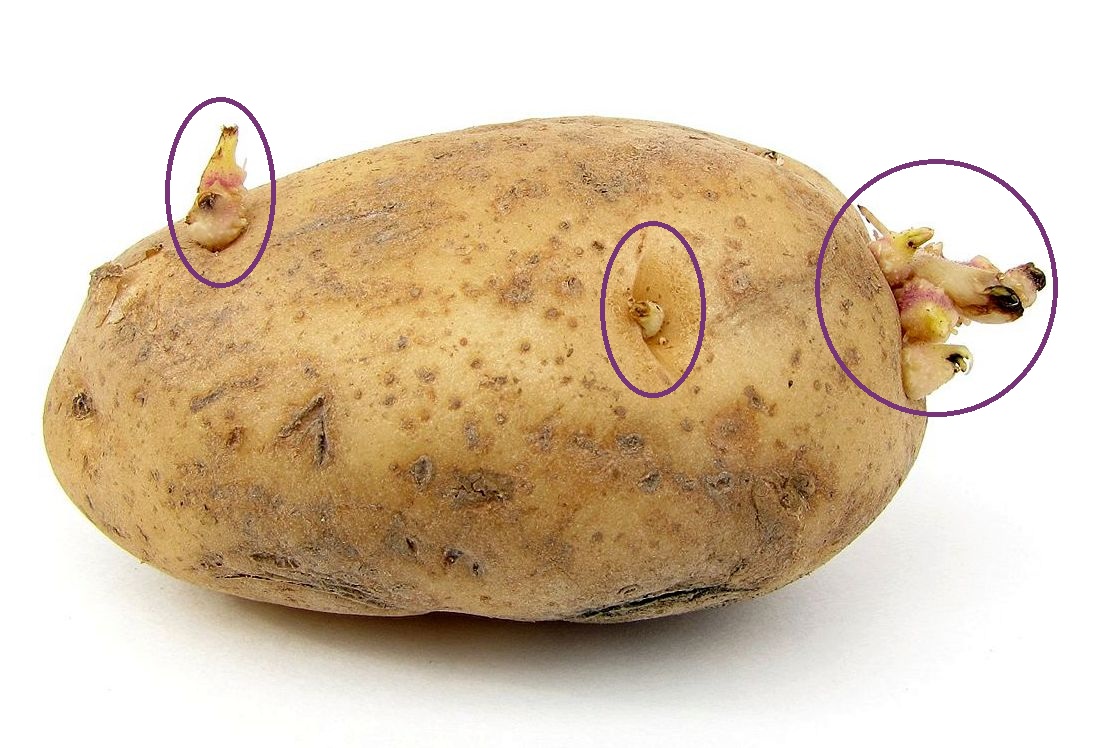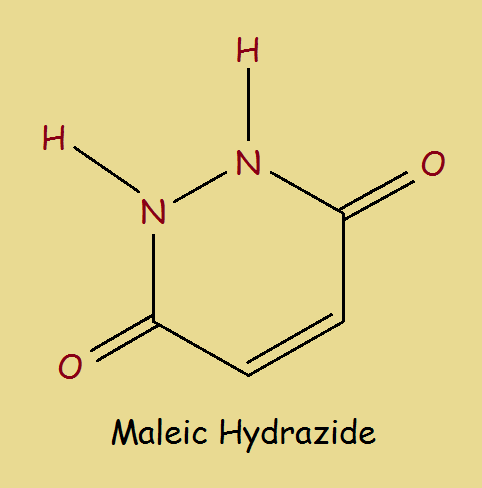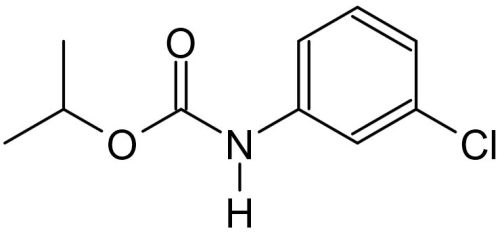
Probably, you pick up a can of food to read the label. You may wish to see what the ingredients are. You are either satisfied or not, so you either put the can in your cart, or back on the shelf.
Sometimes though, there is no list of ingredients. Like when you buy an apple.
If the apple is very shiny, you probably suspect the apple has been waxed.
But there are times when you cannot visibly determine what has been applied to a food item.
Such is the case when you purchase a potato. Are you aware that after harvesting, the potatoes were given a chemical spray? After all, the potatoes may be in storage for four to six months or more.
During that time, untreated potatoes would develop “eyes.”
Who wants to purchase potatoes with eyes? Few enough people, apparently, that growers and grocers want to inhibit eye growth.
Inhibiting Growth of Eyes Early On
One obvious approach is to inhibit eye growth in developing potatoes – while they are still in the ground. The currently popular chemical for the purpose is maleic hydrazide, also known as 1,2-dihydropyridazine-3,6-dione. Growers must apply care in not applying the hydrazide too early, or fewer tubers will develop.

The EPA facts sheet for Maleic Hydrazide says, “Current use practice limitations prohibit treating crops within 7 days of harvest, and grazing or feeding forage or hay from treated areas to livestock.” This is doubtless of importance because the hydrazide doesn’t remain on the foliage or the outside of the potato, but penetrates through the phloem into tuber interiors.
Stored Potatoes and Eye-Growth Inhibitor
After cleaning and healing wounds from the harvesting process, producers can treat stored potatoes – oftentimes by misting – to prevent the growth of potato eyes or buds.
The chosen chemical for this process is chlorpropham, or isopropyl (3-chlorophenyl) carbamate. Other disciplines often employ carbamates as insecticides, preservatives and polyurethanes.
The EPA facts sheet for Chlorpropham indicates in its use for potatoes, that it is non-carcinogenic, but is not without risks, and that the tolerance value for post-harvest potatoes should be reduced from 50 ppm (parts-per-million) to 30 ppm.
What Happens When You Cook These Chemicals?
At least one study indicates that residues of maleic hydrazide after cooking is not significantly different than levels before cooking. Residues of chlorpropham were a little less for cooked potatoes than for raw ones, however you’ll eliminate most of the chemical if you remove the peelings, and avoid eating them.

Wash Your Potatoes to Remove Eye-Growth Inhibitor
As might be expected in the case of a commercial product, persons who profit from consumer use of that product will tend to minimize risks associated with it. Others who would profit if that product was put in a negative light are likely to overemphasize its failings. Government agencies generally maintain a stand more middle of the road. It is up to the informed public to determine the viewpoint they will adopt.
If you choose to purchase potatoes that have received treatments either during growth or after, it is a good idea to thoroughly wash the potatoes, especially if you’re planning to eat the skins.
Note: You might also enjoy The Dreaded Leaf Roll Virus
References:
- University of Maine. Potato Sprout Inhibitors. (2012)
- Registrations and Regulatory Affairs. Crop Data Management Systems (CDMS): Material Data Safety Sheet – Sprout Nip. (2012)
- Idaho Potato. Idaho Potato: Chemicals on Potatoes? (2014)
- BRENNTAG CANADA INC. Sprout Nip E.C. Potato Sprout Inhibitor. (2009)
- Environmental Protection Agency: Integrated Risk Information System. Chlorpropham. (2012)
- Springer. Residues of free and bound maleic hydrazide in potato tubers. (1999)
- IPCS Inchem. Maleic Hydrazide. (1977)
- Organic Gardening. Potatoes: A Growing Guide
- Environmental Protection Agency. Maleic Hydrazide. (1994)
- Environmental Protection Agency. Chlorpropham. (1996)
← Back to Food and Health
← Home

We are not currently eating potatoes (on a special diet) but when we do, we always eat the skins unless the potatoes were peeled for mashing. I must see if this (chemicals applied) happens in Northern Ireland. We get potatoes sprouting at times, especially at this time of year. The reason I use those potatoes quickly if they develop eyes is that these sprouts use up food resources from the tuber to help their growth, so the potatoes get soft.
Depending on the variety of potato and how it is prepared, I enjoy the skin as well… that is, with a whole lot of butter and salt!
[…] seed potatoes or save your own specifically to be used as seeds. Potatoes are often sprayed with a sprout inhibitor hormone which is why I buy organic potatoes. Non-certified seed potatoes can carry disease you don’t […]